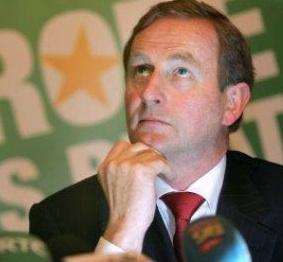Fine Gael's hypocrisy is Labour's gain

Fine Gael's sudden implosion could be Labour's, not Fianna Fáil's, gain. By Joe Galvin.
In politics, timing is everything, and in the past year, Fine Gael's timing has consistently been out. Sometimes the party have acted too slowly; their failure to move quickly to condemn John O'Donoghue is an example. In that instance, they were gazumped by Eamonn Gilmore. Last weekend they were gazumped by their own spokesperson on finance, Richard Bruton.
Bruton's naked ambition has always been his least endearing characteristic, and this time it will seriously damage Fine Gael. Bruton used his party's woeful showing in the Irish Times/Ibsos opinion poll as a lever to set the party machinery in action and enact a leadership coup against Enda Kenny. This was, at last, to be Bruton's moment. First the party leadership, than the position of Taoiseach.
But, of course, his timing was all wrong and a huge schism has opened up within Fine Gael. The party now look utterly hypocritical for their support of a no-confidence motion against Brian Cowen last week, and as their chief whip Paul Kehoe groaned in an all-too-accurate statement: "It is totally, totally car-crash politics." Indeed.
At the time of writing, nine of Fine Gael's 16-strong front bench have signalled they have no confidence in Kenny. The Bruton Nine delivered their verdict at a joint press conference following a fractious party meeting in Leinster House earlier this afternoon. With those kind of numbers, it is eminently possible that Kenny will be deposed following the secret ballot of the parliamentary party, and Bruton will finally land the leadership he has coveted for so long. But at what cost for Fine Gael?
Bruton's criticism of Kenny is unlikely to be welcomed by rural party members with whom Kenny is still a popular figure, and Kenny's swift dismissal of Bruton stirred further disgruntlement amongst the already disenchanted deputies. “There are many opinion polls and ratings of his leadership and many occasions on which he has faltered at crucial times – and we do need people’s confidence now,” said Bruton in an interview with RTÉ. The leadership struggle continues to grow more bitter, and it has exposed serious divisions between the parties urban young guns, such as Leo Varadkar and Simon Coveney, and its rural old guard, such as Phil Hogan and Kehoe.
They are no doubt ceilí dancing in the corridors of Fianna Fáil headquarters, but the real beneficiaries from this fiasco could be the Labour Party. Fianna Fáil under Brian Cowen is going to remain in the doldrums no matter what internal turmoil their old enemy undergoing. Labour now has a better opportunity than ever to head for the high ground.
On the face of it, it is all falling into place for Labour. Huge surges in opinion polls married with the struggles of Fine Gael and Fianna Fáil could conceivably conspire to make them the largest party in the next election. It is, of course, a long-odds shot. Rural Ireland has yet to take Labour to its hearts, and it is often there where elections are won and lost. At the very least, however, it should allow Labour to break through and make the next Irish general election a genuine three-way race.
Indeed, there is real sense of belief within the party that this is their time. “I believe that politics has now become a three-way contest in this country," said Eamonn Gilmore following the Irish Times poll. "What I think today’s opinion poll confirms is my belief and my conviction that that three-way contest can be won by the Labour Party.” His comments were echoed by deputy leader Joan Burton.
However, the party's real stumbling block in their journey towards that high ground is Gilmore. Never before will Labour have such ammunition to fire against the Big Two, but Gilmore's cautious conservatism and wariness of upsetting his potential coalition partners Fine Gael could keep Labour's guns in their holsters.
He has been exceptionally slow to criticise Kenny or Fine Gael, and refused to comment on Kenny's poor showing in the Irish Times poll. He has admitted that a Labour/Fine Gael coalition is the most likely result at the next general election, and said: "I think the issue that has to be decided is the respective strengths of the parties in that government and which party would lead it."
Gilmore hopes to lead that government, but tying himself to struggling Fine Gael could cost him. While no Mullingar Pact is in the offing, he believes and admits that coalition with Fine Gael is almost inevitable. Still, he allows Labour to lie in Fine Gael's shadow.
Fence straddling has always been Gilmore's specialty but, in this instance, it could be a barrier to Labour finally breaking through to the big time. To paraphrase Dev, Labour may have to wait that little bit longer.
